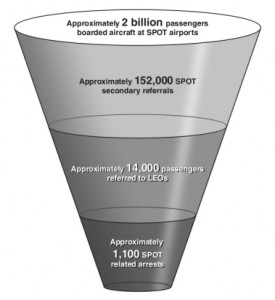In testimony before a Canadian parliamentary hearing last week by Assistant Commissioner Chantal Bernier, the office of the Privacy Commissioner of Canada raised questions (previously asked in the Canadian press) about the implications for Canadian travelers of the US Secure Flight program — questions that travelers in the US and other countries should share.
Asst. Privacy Commissioner Bernier noted that despite Canadian objections, the US continues to insist on applying the Secure Flight requirements (transmission of passenger data to the DHS, and receipt by the airline of affirmative DHS permission before each prospective passenger is allowed to board a flight) to flights that pass through US airspace to and from Canada, even if they never land in the USA. This includes most flights between Canada and Central America, South America, and the Caribbean. As Bernier pointed out to Members of Parliament, “This means that DHS will collect personal information of Canadian travelers. This is not without risk.”
It’s worth noting, although it wasn’t reported to have been mentioned at the hearing, that Canada imposes no comparable requirement for the vastly larger number of flights to and form the USA that pass through Canadian airspace. These include virtually all transatlantic flights to and from the USA, and transpacific flights to and from all points in the USA east of the West Coast. Nor does any other country through which flights routinely pass en route to and from the USA. Most flights between Miami and Latin America, for example, pass over Cuba. But American Airlines is required neither to provide the Cuban government with detailed information about each passenger on those flights, nor to obtain Cuban government permission before allowing them to board.
Important as they are, however, the concerns raised in last week’s testimony suggest that even the Office of the Privacy Commissioner of Canada still doesn’t fully appreciate the scope of the problem or of the violations of Canadian law.
Asst. Comm. Bernier’s statement was limited to flights to, from, or overflying the USA. We suspect that her office is unaware that the DHS already has ways to get access — without the knowledge or consent of anyone in Canada, including airlines and travel agencies — to information about passengers and reservations for flights within Canada and between Canada and other countries, regardless of whether they pass though US airspace.
Read More →
